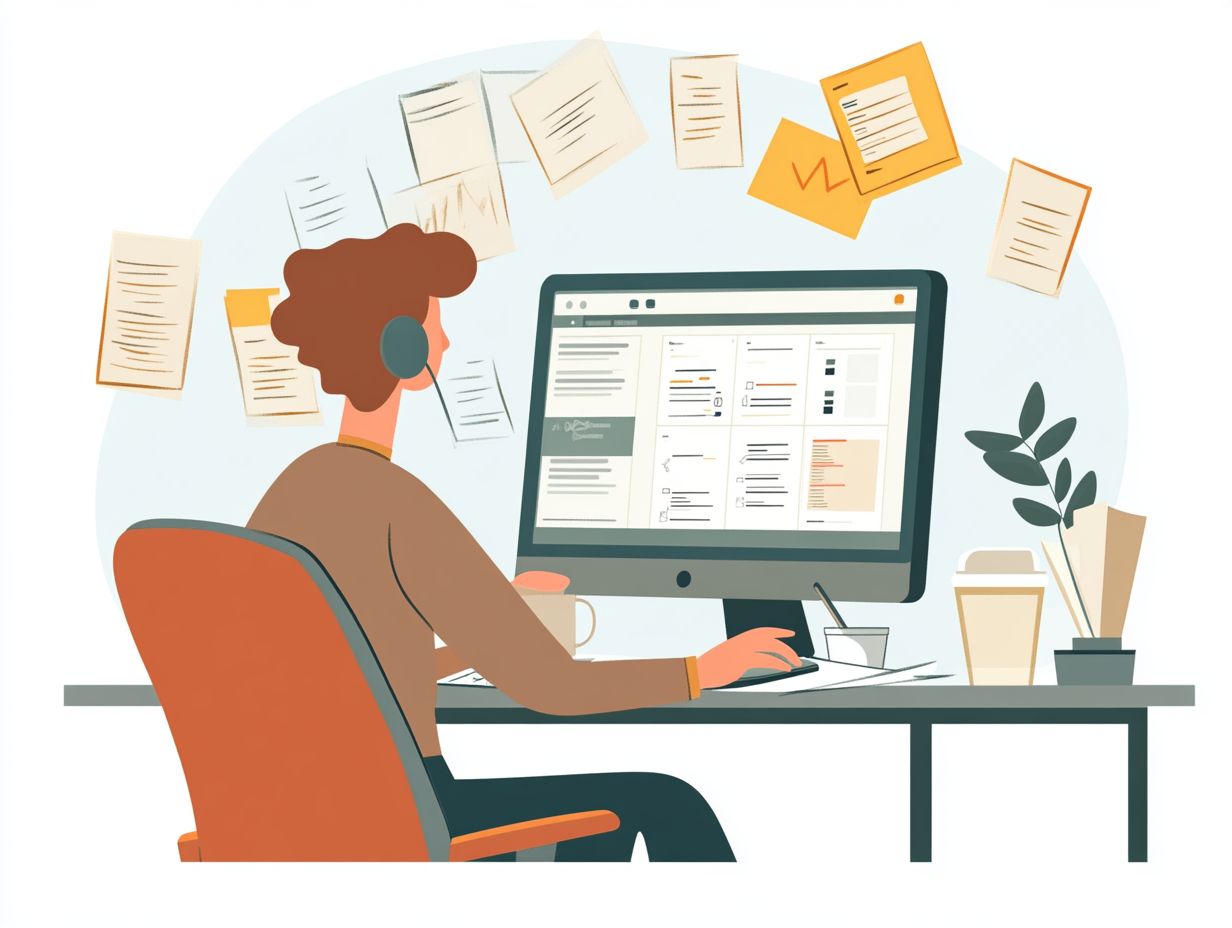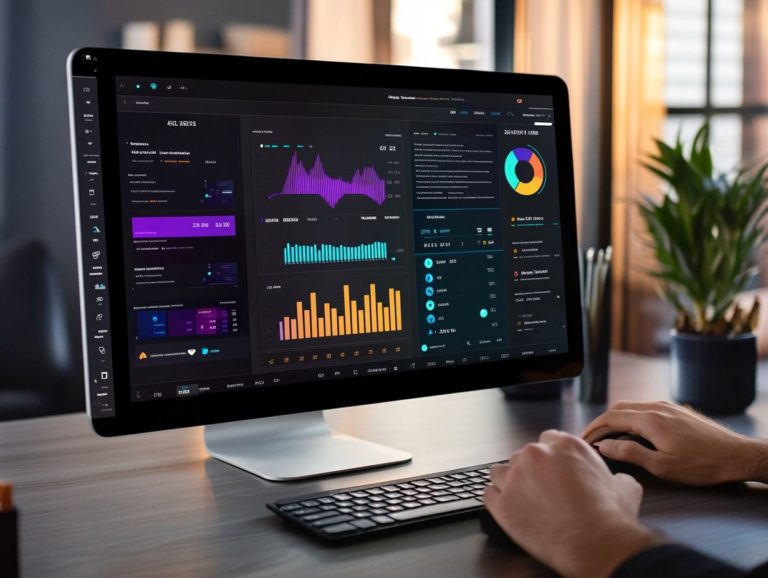How to Use CRM for Effective Follow-ups
In today s fast-paced business landscape, effective follow-ups can truly transform the way you nurture customer relationships.
Grasping how Customer Relationship Management (CRM) tools can elevate your follow-up strategies is essential. This article delves into the core principles of CRM, showcasing its benefits for streamlining communication and outlining best practices for implementation.
It also points out common pitfalls to steer clear of and offers expert tips to maximize your follow-up efforts. Whether you re just starting with CRM or seeking to refine your existing approach, this guide provides valuable insights to pave your path to success.
Contents
- Key Takeaways:
- Understanding CRM for Follow-ups
- Benefits of Using CRM for Follow-ups
- Best Practices for Follow-ups with CRM
- Common Mistakes to Avoid in Follow-ups with CRM
- Maximizing Results with CRM Follow-ups
- Frequently Asked Questions
- What is a CRM and why is it important for effective follow-ups?
- How can I use a CRM for follow-up emails?
- Can a CRM help me keep track of customer interactions?
- How can I use a CRM for personalized follow-ups?
- Is it possible to track the success of my follow-ups using a CRM?
- How can a CRM help me prioritize and manage follow-ups?
Key Takeaways:

- Utilize CRM to streamline communication and improve efficiency in follow-ups.
- Track and analyze customer interactions with CRM for better understanding and personalized follow-ups.
- Create a follow-up plan and utilize CRM features for successful follow-up strategies to maximize results.
Understanding CRM for Follow-ups
Understanding Customer Relationship Management (CRM) is essential for refining your follow-up process in sales and maximizing CRM features.
A well-implemented CRM system seamlessly streamlines communication between your sales team and potential customers. This enhances your ability to manage sales leads more effectively.
By leveraging CRM tools, you can carefully track responses and maintain a comprehensive follow-up history, which is vital for nurturing customer relationships. Additionally, learning how to use CRM for inventory management can further enhance your efficiency.
CRM technology automates follow-up reminders, ensuring your interactions are always timely don’t miss out on potential sales! This significantly boosts customer retention and lead conversion rates.
What is CRM and its Role in Follow-ups?
CRM, or Customer Relationship Management, is your key technology for mastering interactions with both current and potential customers, especially during those critical follow-up stages.
Think of it as your central command center, carefully tracking customer activities, preferences, and feedback, so your sales team always has vital information at their fingertips.
With automated reminders and personalized communications at your disposal, you can effortlessly streamline follow-up methods whether it s emails, phone calls, or even social media interactions.
The impact on your sales process is transformative. CRM empowers you to cultivate stronger relationships through timely touchpoints and boosts conversion rates by enabling you to customize your strategies based on rich customer data.
In the end, a robust CRM system can dramatically shorten your sales cycles and elevate customer satisfaction to new heights.
Benefits of Using CRM for Follow-ups
Using a CRM for follow-ups opens the door to amazing benefits for your sales performance and customer relationship management.
Streamlining Communication and Improving Efficiency
One of the primary benefits you gain from using CRM in your follow-ups is the ability to streamline communication and enhance efficiency within your sales team.
This streamlined communication enhances collaboration among team members and ensures that leads are nurtured consistently and effectively.
By leveraging CRM tools, you can automate follow-ups, significantly reducing the likelihood of missed opportunities. These platforms enable you to schedule reminders and track interactions, boosting accountability and ensuring that every potential client receives timely responses. For more detailed insights, check out this guide on how to use CRM for lead generation.
Automation features cut down on repetitive tasks, allowing your team to concentrate on building relationships and closing deals. This ultimately translates to improved performance and higher conversion rates, driving your success even further.
Tracking and Analyzing Customer Interactions

Effective tracking and analysis of customer interactions is one of the many critical advantages you gain by utilizing a CRM for follow-ups in your sales processes.
With a well-implemented CRM system, you can unlock valuable insights into every touchpoint you have with potential clients. This includes everything from initial inquiries to post-purchase satisfaction.
This comprehensive approach allows you to understand the details of customer preferences and behaviors, ensuring that each follow-up is perfectly tailored to meet specific needs.
By diving into follow-up history, CRM tools help you spot patterns in communication, paving the way for more personalized engagement.
These systems also provide important sales numbers, such as conversion rates and response times, giving you a clearer picture of your effectiveness and pinpointing areas for improvement.
Best Practices for Follow-ups with CRM
Implementing best practices for follow-ups can supercharge your sales team s effectiveness in cultivating customer relationships.
Creating a Follow-up Plan
Creating a detailed follow-up plan is essential for optimizing your customer retention and ensuring effective communication with leads through your CRM. By outlining specific sales strategies tailored to the unique needs of each potential client, you can truly enhance your approach.
It s crucial to establish a follow-up frequency that strikes the right balance; timing your communications to be informative without crossing into intrusive territory is key. Consistent communication not only keeps your brand front and center but also fosters trust and builds stronger relationships.
You can keep engagement strong by using various channels like emails, phone calls, and social media. This will help you maintain engagement, ensuring that no lead feels neglected and has the opportunity to convert into a loyal customer.
Utilizing CRM Features for Follow-ups
Utilizing the diverse features of CRM systems can significantly enhance your follow-up process, ultimately improving lead generation and elevating your sales performance.
These systems come equipped with advanced follow-up automation tools, allowing you to schedule reminders and send personalized messages at just the right moments, ensuring that no potential lead slips through the cracks.
Tracking customer insights provides you with invaluable data on customer behavior and preferences, enabling you to craft tailored interactions that resonate.
With features designed to manage sales performance, you can effortlessly monitor outcomes and refine your strategies based on solid analytics.
By capitalizing on these functionalities, you can forge deeper connections with clients and streamline your sales workflows with remarkable efficiency.
Common Mistakes to Avoid in Follow-ups with CRM
Avoiding common mistakes will help you engage prospects effectively and elevate your customer relationships to new heights.
Over-communication or Neglecting Follow-ups

Striking the right balance in your follow-up communication is essential to avoid the traps of over-communication and the missed opportunities that come from neglecting valuable follow-ups.
When businesses bombard potential clients with messages, it risks overwhelming them, often leading to disengagement. On the flip side, neglecting to follow up can result in lost opportunities and a lack of engagement that could have nurtured a meaningful relationship.
To navigate this delicate landscape, effective follow-up methods embedded within a Customer Relationship Management (CRM) system can truly transform your approach. By utilizing automated reminders and personalized templates in your CRM, you can streamline your communication. For more insights, check out how to use CRM for email marketing. This ensures each interaction is relevant and timely, enhancing client relationships without overwhelming them.
With adequate training on these tools, your team can masterfully maintain this equilibrium, enhancing client relationships without the stress of missteps.
Not Personalizing Follow-up Interactions
Neglecting to personalize your follow-up interactions can lead to missed opportunities for forging strong customer relationships through CRM.
When you tailor your messages to reflect a customer s past interactions and unique needs, you make them feel valued and boost their engagement. Effective follow-up communications should acknowledge previous conversations, provide relevant solutions, and offer actionable insights.
By leveraging CRM data, you can create follow-ups that resonate deeply. This transforms generic messages into thoughtful notes that capture interest and foster loyalty.
Incorporating customers names, referencing their preferences or recent purchases, and offering personalized recommendations can significantly enhance the effectiveness of your communications. This results in stronger connections and improved customer satisfaction.
Maximizing Results with CRM Follow-ups
To maximize results with CRM follow-ups, implement effective strategies that drive sales conversions and enhance customer engagement. Learning how to use CRM for event management can further turn your interactions into meaningful connections, elevating both your sales performance and customer satisfaction.
Tips for Successful Follow-up Strategies
- Blend effective sales techniques with consistent communication through your CRM.
- Leverage customer relationship management tools to track interactions and analyze customer behaviors.
- Engage in timely follow-up communication to strengthen the connections you established during initial interactions.
- Address potential concerns before they escalate and engage customers positively.
- Personalize your messages and offer value-driven insights to enhance their experience.
- Set reminders and utilize automation to ensure consistent touchpoints that foster trust and encourage long-term relationships.
Frequently Asked Questions
What is a CRM and why is it important for effective follow-ups?

A CRM, or Customer Relationship Management, is software that helps businesses manage their interactions with current and potential customers. It is crucial for effective follow-ups as it allows businesses to track customer interactions, stay organized, and personalize communication for better customer engagement.
How can I use a CRM for follow-up emails?
A CRM can help you schedule and automate follow-up emails to your customers. You can set triggers based on certain actions, such as a customer making a purchase, prompting the CRM to send out a follow-up email at a designated time for timely and efficient communication.
Can a CRM help me keep track of customer interactions?
Yes, a CRM helps keep track of customer interactions by storing all communication, such as emails, calls, and meetings, in one place. This allows for a complete overview of all interactions and helps avoid missing important follow-ups.
How can I use a CRM for personalized follow-ups?
A CRM personalizes follow-ups by providing you with a customer’s purchase history, preferences, and other important information. To enhance this process, learn how to utilize CRM for better marketing campaigns. This allows you to tailor your follow-ups to their specific needs and interests, making them more effective and impactful.
Is it possible to track the success of my follow-ups using a CRM?
Yes, a CRM provides analytics and reports on the success of your follow-ups. You can track metrics such as open rates, click-through rates, and response rates to see which follow-ups are most effective and make improvements as needed.
How can a CRM help me prioritize and manage follow-ups?
A CRM can help prioritize and manage follow-ups by allowing you to set reminders and deadlines, categorize follow-ups by urgency, and assign tasks to team members. Implementing tips for effective lead management in CRM ensures that no follow-up falls through the cracks and helps you stay on top of important customer interactions.
If you have any further questions, feel free to ask!





